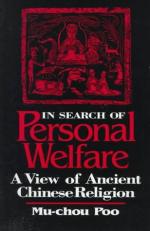|
This section contains 3,502 words (approx. 12 pages at 300 words per page) |

|
DAO AND DE, the "way" and "virtue," respectively, are basic Chinese philosophical concepts with particular relevance in the Daoist tradition. They are important separately as politico-philosophical and religious terms. Joined as a binomial, dao-de appears first in the third century BCE and plays a key role in religious Daoist speculation. In modern Chinese, dao-de means "morality."
Dao is the word for "road" or "pathway." It has no other sense in the earliest texts—that is, in the oracle bones of the Shang dynasty (c. 1200 BCE). By the time of the Eastern Zhou (770–256 BCE), dao comes to mean the correct or natural way something is done, especially in the actions of rulers and kings (Vandermeersch, 1980). Used as a verb, dao also means to "show the way," "tell," or "guide," and hence gains the meaning "teaching" or "doctrine." In both these senses, the term is central...
|
This section contains 3,502 words (approx. 12 pages at 300 words per page) |

|


